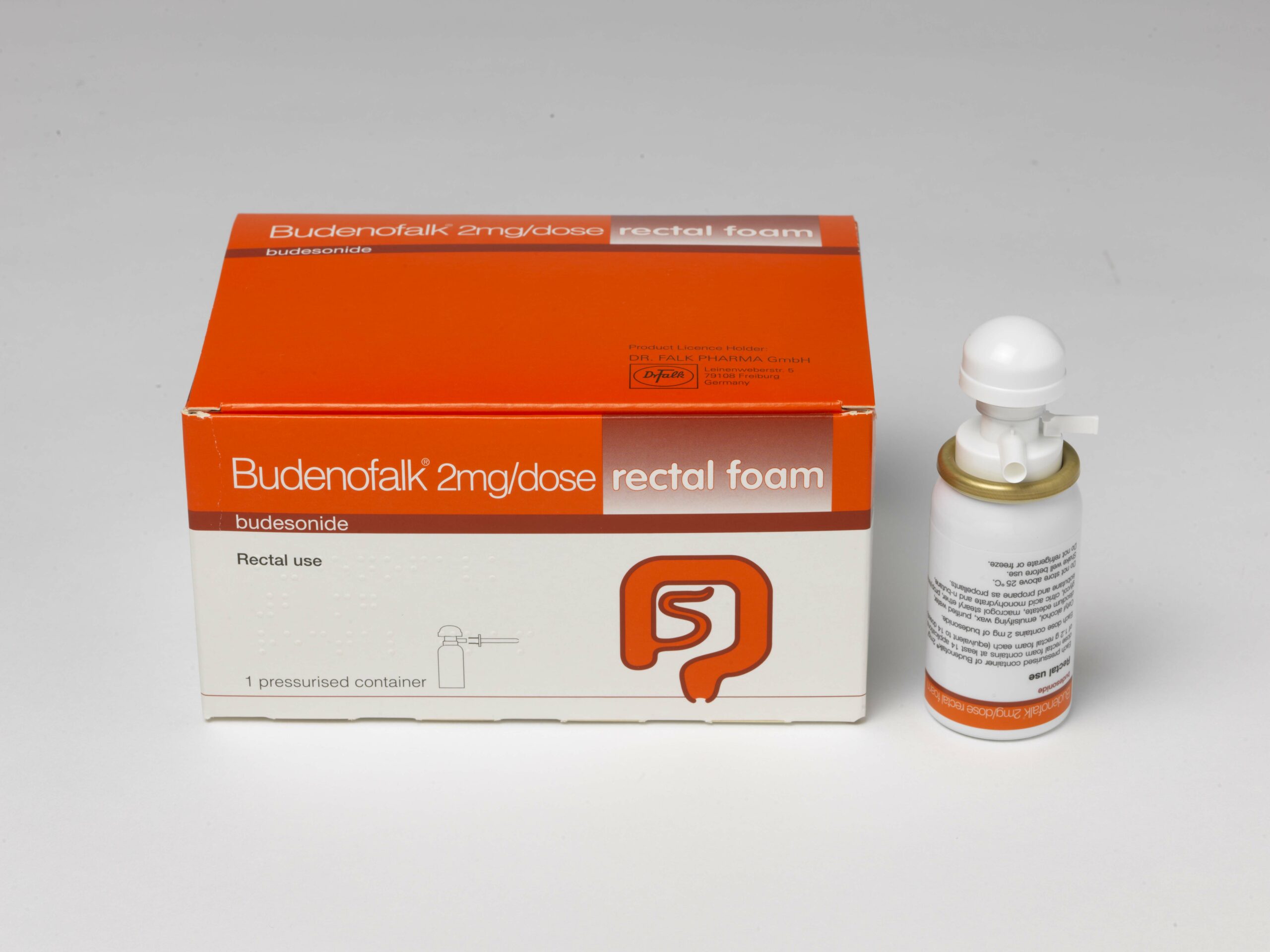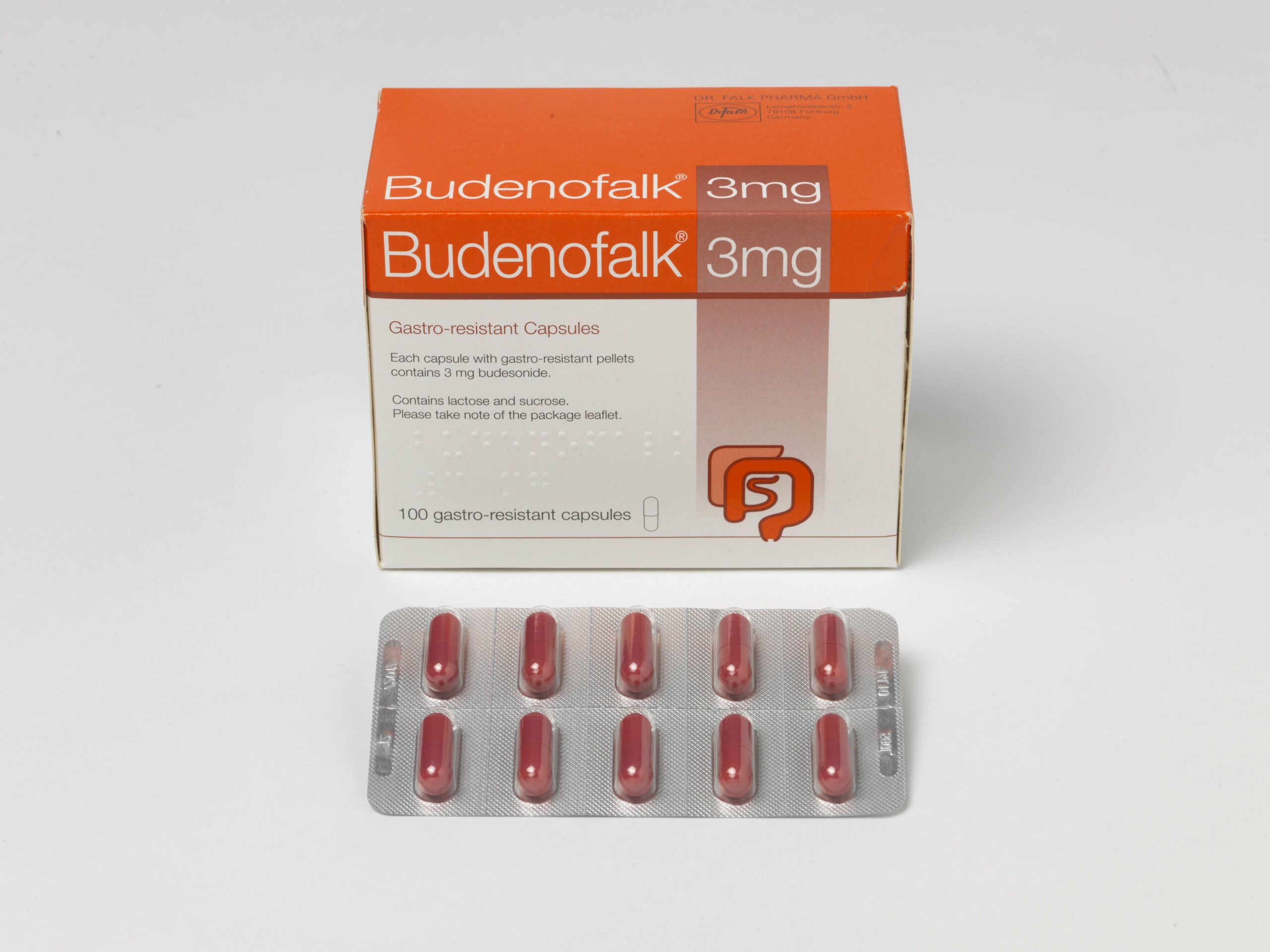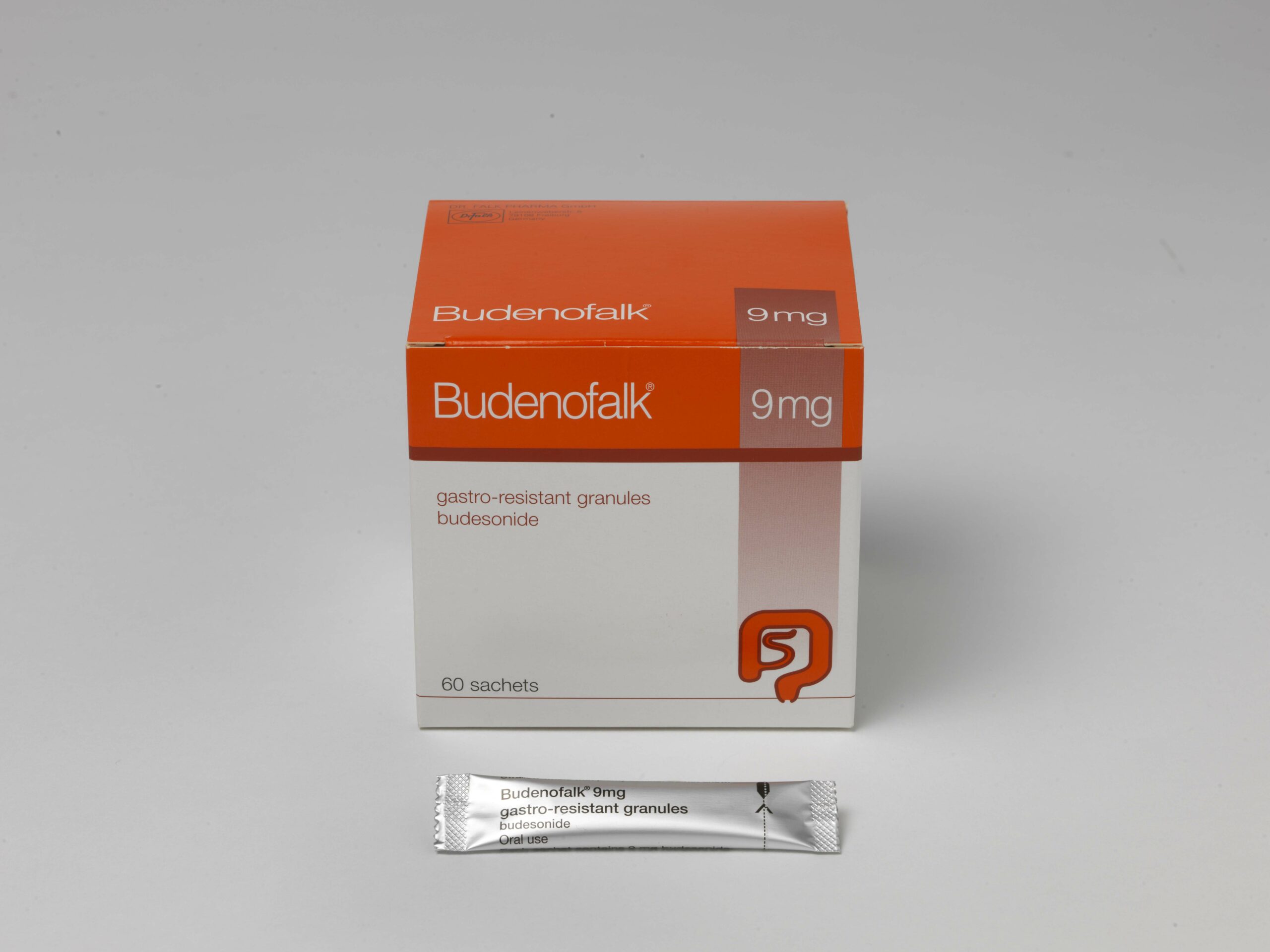Prescribing Information (Refer to full SPC before prescribing)
Presentation: Budenofalk® gastro-resistant capsules, each containing 3mg budesonide, 240mg sucrose and 12mg lactose monohydrate. Budenofalk® gastro-resistant granules, each sachet contains 9mg budesonide, 828mg sucrose, 36mg lactose monohydrate and 900mg sorbitol. Indications: Capsules: Induction of remission of mild to moderate active Crohn’s disease affecting the ileum and/or the ascending colon. Microscopic colitis. Autoimmune hepatitis. Granules: Induction of remission of mild to moderate active Crohn’s disease affecting the ileum and/or the ascending colon. Induction of remission in patients with active microscopic colitis in adults aged ≥ 18 years. Dosage: All – take with a glass of water half an hour before meals. Take once-daily doses in the morning. Adults: Capsules: Crohn’s disease: 9mg once daily or 3mg three times a day. Microscopic colitis: Induction of remission: 9mg once daily. Maintenance: lowest effective dose – 6mg once daily or 6mg once daily alternating with 3mg once daily. Autoimmune hepatitis: induction of remission: 3mg three times a day. Maintenance: 3mg twice a day. Increase back to 9mg daily if ALAT &/or ASAT increase. Granules: Crohn’s disease and induction of remission in microscopic colitis: 9mg once daily in the morning. Duration of treatment: Induction: Crohn’s disease, microscopic colitis: 8 weeks. Autoimmune hepatitis – until remission is achieved then maintenance for at least 24 months. Do not stop any treatment abruptly but taper gradually. Contra-indications: hypersensitivity to any constituent. Hepatic cirrhosis. Warnings/Precautions: Change from other steroids may result in symptoms due to reduced systemic steroids. Use with caution in patients with tuberculosis, hypertension, diabetes mellitus, osteoporosis, peptic ulcer, glaucoma, cataracts or family history of glaucoma or diabetes or any condition in which glucocorticosteroids may have undesirable effects. Not appropriate for upper GI Crohn’s or extraintestinal symptoms. Prolonged, high dose use may result in glucocorticosteroid systemic effects. Infection: suppression of the inflammatory response and immune function increases susceptibility to infections and their severity. Clinical presentation of infections may be atypical and presentation of serious infections may be masked. Chickenpox and herpes zoster are of particular concern. Passive immunisation needed within 10 days in exposed non-immune patients taking systemic glucocorticosteroids. Urgent specialist care required on confirmed chickenpox. Give normal immunoglobulin immediately after measles exposure. Do not give live vaccines to those with chronic glucocorticosteroid use. Antibody response to other vaccines may be diminished. With severe liver function disorders: increased systemic bioavailability expected. Central serous chorioretinopathy or other causes may result in blurred vision/visual disturbances. Consider referral to ophthalmologist. Suppression of the HPA axis and reduced stress response: supplementary systemic glucocorticoid treatment may be needed. Avoid concomitant treatment with CYP3A4 inhibitors. Do not use in patients with galactose or fructose intolerance, glucose – galactose malabsorption, sucrase – isomaltase insufficiency or total lactase deficiency or congenital lactase deficiency. In autoimmune hepatitis evaluate transaminase levels every 2 weeks for the first month and then every 3 months. Interactions: Co-treatment with CYP3A inhibitors including cobicistat containing products may increase side effects and should be avoided where possible. Beware concomitant administration of cardiac glycosides and saluretics. CYP3A4 inducers: may reduce systemic and local exposure, necessitating dose adjustment of budesonide. CYP3A4 substrates: may compete with budesonide increasing plasma concentrations depending on relative affinities. Small, non-significant effect of cimetidine on budesonide kinetic effects. Oestrogens/oral contraceptives (not oral low dose combination contraceptives) may elevate plasma concentrations and enhance corticosteroid effects. Steroid-binding compounds and antacids may reduce budesonide efficacy; administer at least 2 hours apart. Because adrenal function may be supressed, an ACTH stimulation test for diagnosing pituitary insufficiency might show false results (low values). Use in pregnancy and lactation: Avoid use in pregnancy unless essential. Do not breastfeed during Budenofalk treatment. Undesirable effects: Cushing’s syndrome, growth retardation in children, glaucoma, cataracts, blurred vision, dyspepsia, abdominal pain, constipation, gastric or duodenal ulcers, pancreatitis, increase in risk of infections, muscle and joint pain and weakness and twitching, osteoporosis, osteonecrosis, headache, pseudotumor cerebri (including papilloedema) in adolescents, depression, irritability and euphoria, psychomotor hyperactivity, anxiety, aggression, allergic exanthema, petechiae, ecchymosis, contact dermatitis, delayed wound healing, increased risk of thrombosis, vasculitis (after withdrawal from long-term treatment), fatigue, malaise. Side effects characteristic of systemic glucocorticosteroid therapy may occur. Exacerbation or reappearance of extraintestinal manifestations when switching from systemically acting glucocorticosteroids may occur. Frequency is likely to be lower than with equivalent dosage of prednisolone. Legal category: POM. Costs: UK NHS: 60 sachets £135; 100 capsules £75.05. Ireland (PtW): 60 sachets: €145.84; 100 capsules: €77.95. Licence holder: Dr Falk Pharma GmbH, Leinenweberstr.5, D-79108 Freiburg, Germany. Licence numbers: (granules) PL08637/0020 (UK) PA573/2/3 (IE) (capsules) PL08637/0002 (UK) PA573/2/1 (IE). Prepared: February 2024
Further information available on request.
Adverse events should be reported. Reporting forms and information can be found at www.mhra.gov.uk/yellowcard or search for MHRA Yellow Card in the Google Play or Apple App Store (UK residents) or at email: medsafety@hpra.ie or at http://www.hpra.ie/homepage/about-us/report-an-issue/human-adverse-reaction-form (residents in Ireland). Adverse events should also be reported to Dr Falk Pharma UK Ltd at PV@drfalkpharma.co.uk




